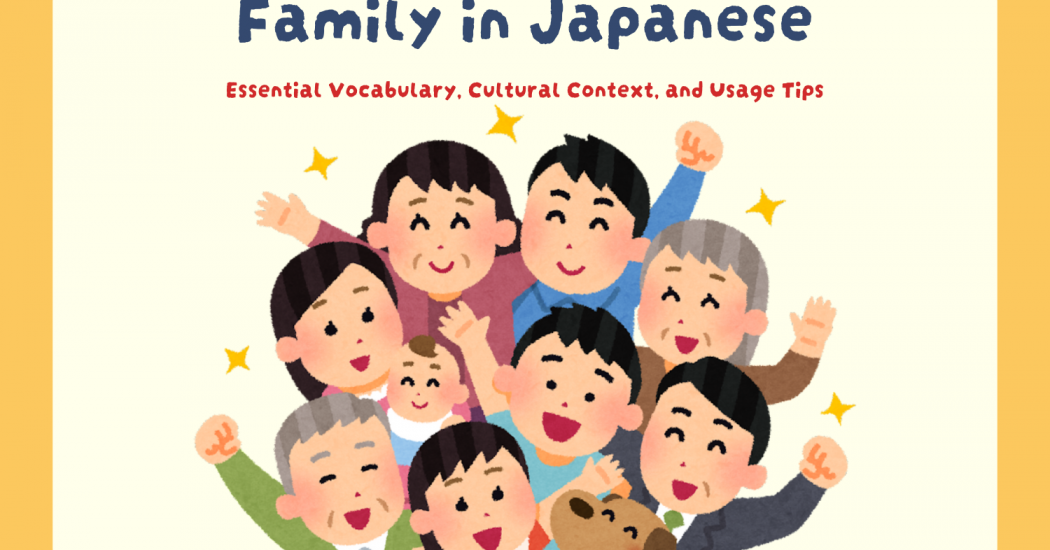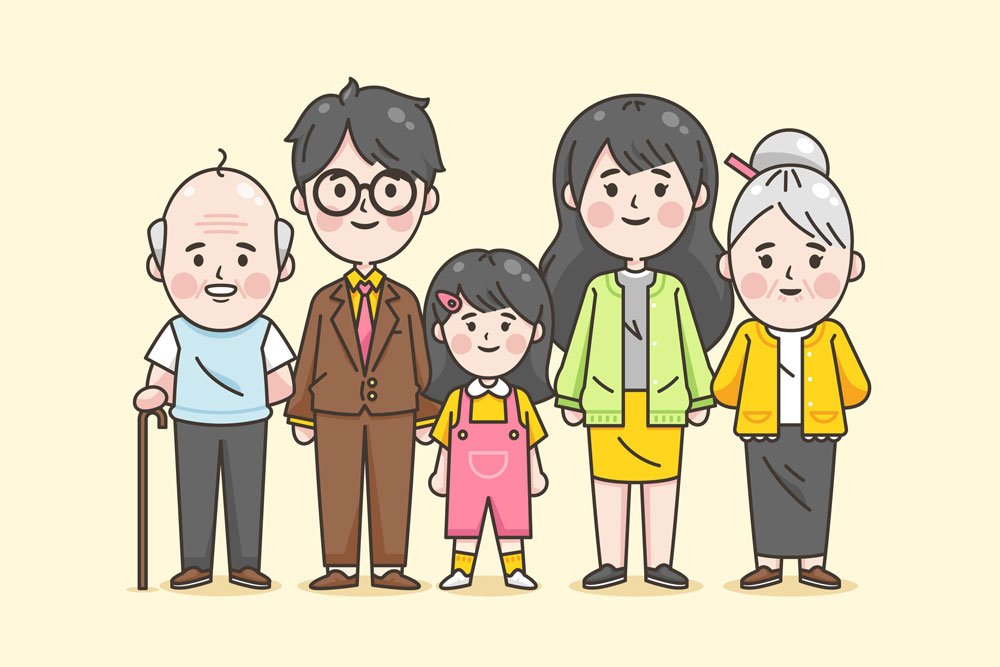How to Pronounce Family Members in Japanese
Understanding how to refer to family members in Japanese is essential for anyone studying the language. Japanese is a language deeply influenced by social structure, age, respect, and relationships. This is especially evident in the way family members are addressed. Whether you’re introducing your family in a conversation, filling out a family tree, or decoding kanji on a Japanese family members chart, it's important to know the correct terms.
In this article, we’ll explore the Japanese terms for family members, how to write them in Hiragana, Kanji, and how to say my family in Japanese word. We’ll also look at cultural aspects and FAQs to help you communicate clearly and respectfully.
What is “family” called?
The accurate word for “family” in Japanese is 家族 (かぞく, kazoku). This term encompasses the nuclear family and can extend to include extended family members depending on the context.
Japanese terms for family members
Here’s a table of common family members in Japanese:
| Meaning | Kanji | Hiragana | Romaji |
| Family | 家族 | かぞく | kazoku |
| Father | 父 | ちち | chichi |
| Mother | 母 | はは | haha |
| Older Brother | 兄 | あに | ani |
| Older Sister | 姉 | あね | ane |
| Younger Brother | 弟 | おとうと | otouto |
| Younger Sister | 妹 | いもうと | imouto |
| Grandfather | 祖父 | そふ | sofu |
| Grandmother | 祖母 | そぼ | sobo |
| Husband | 夫 | おっと | otto |
| Wife | 妻 | つま | tsuma |
| Son | 息子 | むすこ | musuko |
| Daughter | 娘 | むすめ | musume |
| Parents | 両親 | りょうしん | ryoushin |
| Siblings | 兄弟 | きょうだい | kyoudai |
Using MochiKanji to learn Japanese terms for family members is incredibly helpful. The app’s flashcards and spaced repetition system make it easy to remember terms like “父” (chichi) for father and “母” (haha) for mother. Start using MochiKanji to master these essential family vocabulary terms efficiently!
Related expressions
In addition to knowing the individual family members, it’s helpful to learn some common expressions:
- My family: 私の家族 (わたしのかぞく, watashi no kazoku)
- Your family: あなたの家族 (あなたのかぞく, anata no kazoku)
- Family gathering: 家族の集まり (かぞくのあつまり, kazoku no atsumari)
- Family home: 実家 (じっか, jikka)
- Family member: 家族の一員 (かぞくのいちいん, kazoku no ichiin)
Read More-: Learn Japanese in 30 Days
How to Pronounce Family Members in Japanese
Correct pronunciation in Japanese focuses on pitch accent and syllabic clarity. For example:
- 父 (chichi): "chi" is said with a light "chee" sound.
- 母 (haha): Both "ha" syllables are soft and not stressed.
To practice pronunciation, learners can use tools such as:
- How to pronounce family members in Japanese PDF – Includes word lists with pronunciation guides.
- How to pronounce family members in Japanese audio – Helps build listening comprehension and speech accuracy.
These resources can be downloaded from language learning platforms or accessed through flashcard apps and Japanese language textbooks.
The Importance of Family in Japanese culture
This term holds a significant place in Japanese culture. The concept of “家族主義” (かぞくしゅぎ, kazokushugi), or “family-centrism,” emphasizes the importance of family loyalty, respect for elders, and the collective over the individual. In traditional Japanese families, multiple generations often live together under one roof, and filial piety (孝, kou) is a deeply valued principle. Respecting and taking care of one’s parents and grandparents is seen as a moral duty.
Learn more vocabulary about family and friends in Japanese
Expanding your vocabulary beyond immediate family members can be beneficial for deeper social interactions. Here are additional terms related to extended family and friends:
Extended family members
- Uncle: 叔父 (おじ, oji)
- Aunt: 叔母 (おば, oba)
- Cousin: いとこ (いとこ, itoko)
- Nephew: 甥 (おい, oi)
- Niece: 姪 (めい, mei)
Friends and relationships
- Friend: 友達 (ともだち, tomodachi)
- Best friend: 親友 (しんゆう, shinyuu)
- Acquaintance: 知り合い (しりあい, shiriai)
- Boyfriend: 彼氏 (かれし, kareshi)
- Girlfriend: 彼女 (かのじょ, kanojo)
Phrases for talking about family and friends
- Do you have siblings?: 兄弟はいますか? (きょうだいはいますか, Kyoudai wa imasu ka?)
- How many people are in your family?: ご家族は何人ですか? (ごかぞくはなんにんですか, Gokazoku wa nan nin desu ka?)
- This is my friend.: こちらは私の友達です。 (こちらはわたしのともだちです, kochira wa watashi no tomodachi desu.)

Practice and learn
To get comfortable with these terms and expressions, incorporate them into your daily practice. Here are some tips:
- Flashcards: Use flashcards to memorize the vocabulary.
- Apply Spaced repetition technique: Spaced repetition is a learning method where you review information at progressively longer intervals. This approach takes advantage of the spacing effect, which indicates that we remember things better when they’re reviewed over time, rather than all at once.
- Daily Conversations: Practice using these words in daily conversations or role-playing scenarios.
- Listening Practice: Listen to Japanese media, such as TV shows and movies, to hear how native speakers talk about their families.
- Writing Practice: Write about your own home and relatives in Japanese to improve your writing skills and vocabulary retention.
Example Sentences
Talking about family:
- 私の家族は5人です。 (わたしのかぞくはごにんです, Watashi no kazoku wa go nin desu.) – “There are five people in my family.”
- 兄が二人います。 (あにがふたりいます, Ani ga futari imasu.) – “I have two older brothers.”
Introducing family members:
- こちらは私の母です。 (こちらはわたしのははです, Kochira wa watashi no haha desu.) – “This is my mother.”
- 彼は私の弟です。 (かれはわたしのおとうとです, Kare wa watashi no otouto desu.) – “He is my younger brother.”
By learning these terms and practicing regularly, you’ll gain a better understanding of Japanese family dynamics and improve your ability to communicate in Japanese. This not only enhances your language skills but also deepens your appreciation of Japanese culture.
Read More-: How to Give and Receive in Japanese

FAQs
1.How do you say Japanese family members?
Japanese family members are referred to using specific terms like chichi (father), haha (mother), ani (older brother), and so on. These words vary based on formality and who you're speaking to.
2.What do Japanese people call family members?
In Japanese, people use humble terms for their own family (e.g., haha for “my mother”) and respectful forms when talking about others’ families (e.g., okaasan for “someone else’s mother”).
3.How do you pronounce family members?
Family member terms are pronounced using standard Japanese syllables, such as kazoku (かぞく) for family and imouto (いもうと) for younger sister. Listening to native speakers or using language apps can help perfect pronunciation.
4.What does Sofu mean in Japanese?
祖父 (sofu) means “grandfather” in Japanese. It is the humble form used when referring to one's own grandfather.
5. What is yo ro shi ku in Japanese?
よろしく (yoroshiku) is a versatile phrase meaning “please treat me well” or “nice to meet you,” often used in greetings or to show politeness when asking for a favor.
Conclusion
Understanding how to pronounce and use vocabulary related to family members in Japanese is a vital part of mastering the language. From learning basic terms like kazoku (family) to expressing more complex relationships and cultural nuances, this topic offers both linguistic value and cultural depth. By practicing daily, using spaced repetition tools, and applying these words in conversations, you’ll not only expand your vocabulary but also gain a deeper appreciation of Japanese family values and traditions. Whether you're just starting your language journey or looking to enhance your conversational skills, learning about family in Japanese is a rewarding and meaningful step forward.











